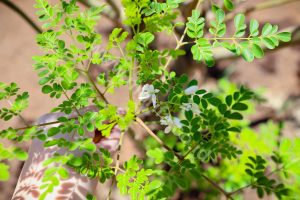Important Vitamins in Moringa
Moringa contains abundant amounts of Vitamin A (Alpha & Beta-carotene), B, B1, B2, B3, B5, B6, B12, C, D, E, K, folic acid, Biotin. In fact, many times the number of food sources known as high nutrient sources.
Basically, there are two groups of vitamins, namely: those that are fat-soluble and those that are water-soluble. Vitamins A, D, E, and K, dissolve in fat so that they need fat to be absorbed by the body. The excess vitamins are stored in your liver and body fat, where they are used when needed. Excessive consumption of fat-soluble vitamins can make you poisoned, causing side effects such as nausea, vomiting, and liver and heart problems.
Vitamin B complex and C, are water-soluble vitamins. Your body uses the vitamins as needed, then excretes the excess through urine. Because these vitamins are not stored in the body, the risk of poisoning is very small compared to fat-soluble vitamins, but the risk of deficiency is higher.
Vitamin B 3 (Niacin)
Vitamin B3 is also known as niacin. This vitamin plays an important role in carbohydrate metabolism to produce energy, fat and protein metabolism. In the body, vitamin B3 has a major role in maintaining blood sugar levels, high blood pressure, healing migraines and vertigo. Various types of toxic compounds can be neutralized with the help of this vitamin.
Vitamin B3 is a type of vitamin that is found in animal foods, such as yeast, liver, kidneys, poultry, and fish. However, there are several other food sources that also contain high levels of this vitamin, including wheat and sweet potatoes. Lack of this vitamin can cause the body to experience spasms, muscle cramps, digestive system disorders, vomiting, and nausea.
Humans need vitamin B3 5-15 mg / day with a maximum limit of 35 mg / day. Vitamin B3 deficiency will cause pellagra with common symptoms of diarrhea, dementia and dermatitis.
Moringa contains vitamin B3 as much as 8.2 mg / 100 grams of dry leaves, 50 times more than the vitamin B3 content in peanuts.

Vitamin C (ascorbic acid)
Vitamin C is mainly found in citrus fruits, kiwi, melon, limes, guava, soursop, mango, strawberries, papaya, tomatoes, cabbage and chilies. This vitamin is very important for growth and development, helps the healing process, boosts the immune system (helps prevent flu), stimulates collagen synthesis, maintains skin elasticity, and maintains healthy bones, teeth, muscles and tendons. Vitamin C also acts as an antioxidant and helps the absorption of iron in the intestines.
Lack of vitamin C can cause mouth sores, nosebleeds, anemia, and joint pain. However, vitamin C deficiency is less common than certain types of vitamin B deficiencies. People with cancer and digestive problems or those who get intravenous drips are more prone to vitamin C deficiency.
Because they are easily damaged by heat and light, foods containing vitamin C should be stored in a cool and shaded place. Consuming too much vitamin C can be dangerous because it causes diarrhea and kidney stones. Because vitamin C aids iron absorption, very high doses can result in iron overload.
For your inquiry about moringa oil/moringa powder :
Contact us :
E-mail: [email protected]
Phone: +6221-2903 4428
Fax: +6221-2903 4429
Sales Mobile/Whatsapp: +62813 8063 7778
Read more :
Get To Know Organic Moringa Leaf Powder, A High Nutritious Product From Indonesia
Moringa Oleifera Health Benefits And How To Use

